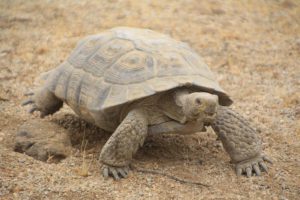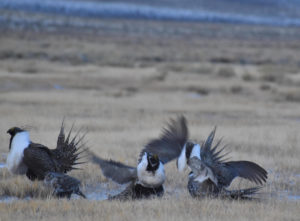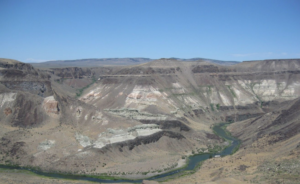For immediate release – January 17, 2011
Contacts: Dr. Michael Connor, Western Watersheds Project California Director, 818.345.0425
LOS ANGELES — On Friday January 14, 2011 Western Watersheds Project filed suit in federal court to halt construction of the Ivanpah solar power plant project being built in the Mojave Desert on public lands in eastern California near the Nevada border. The project site consists of 5.4 square miles of high quality habitat for the threatened desert tortoise.
“No project can be considered clean or green when it involves destruction of habitat for a species listed under Endangered Species Act on this scale,” said Michael Connor, California Director for Western Watersheds Project. “The Department of Interior is tasked with siting energy projects in an environmentally sound manner. Instead it is allowing thousands of acres of important desert tortoise habitat to be bulldozed when there are alternative ways of generating power.”
Threatened by habitat loss, habitat degradation, disease, and predation by ravens and coyotes, the Mojave population of the desert tortoise was listed as threatened under the Endangered Species Act in 1990. Since then, populations have continued to decline. The Ivanpah Valley is home to the most genetically distinct of the five recognized California desert tortoise populations. Desert tortoises on the Ivanpah power plant site are one of the highest elevation breeding populations known, and the area provides essential habitat connectivity through the mountain passes to desert tortoise populations in the neighboring valleys.
“The environmental review for this project was rushed and inadequate – the agencies did not even determine how many desert tortoises were on the site, nor did they determine what impact blocking the north Ivanpah Valley with an industrial-scale power plant would have on connectivity with other tortoise populations,” said Connor.
The site located in relatively undisturbed Mojave Desert near Mojave National Preserve, is prime habitat for 19 other rare animal species including desert bighorn sheep, golden eagles and burrowing owls, and several rare plants in addition to desert tortoise. There are impressive stands of barrel cactus, and centuries-old Mojave yucca.
“The federal government’s rush to approve this ecologically disastrous project is a textbook example of how NOT to address our energy needs,” said Western Watershed Project’s attorney Stephan Volker. “Virtually every significant environmental law was shortcut to shoehorn this destructive project into this ecologically irreplaceable site, despite the known availability of cheaper and better power sources including conservation, roof-top solar, and energy development in existing industrial zones,” added Mr. Volker.
The 1.7 billion dollar power plant project is being underwritten with $1.3 billion in federal loan guarantees and “economic stimulus” funds. Secretary of the Interior Salazar approved the project in October.
Western Watersheds Project’s mission is to protect and restore watersheds and wildlife on public lands throughout the American west through education, research, public policy initiatives and litigation. Western Watersheds Project has offices in six western states including California.
Read the Complaint





